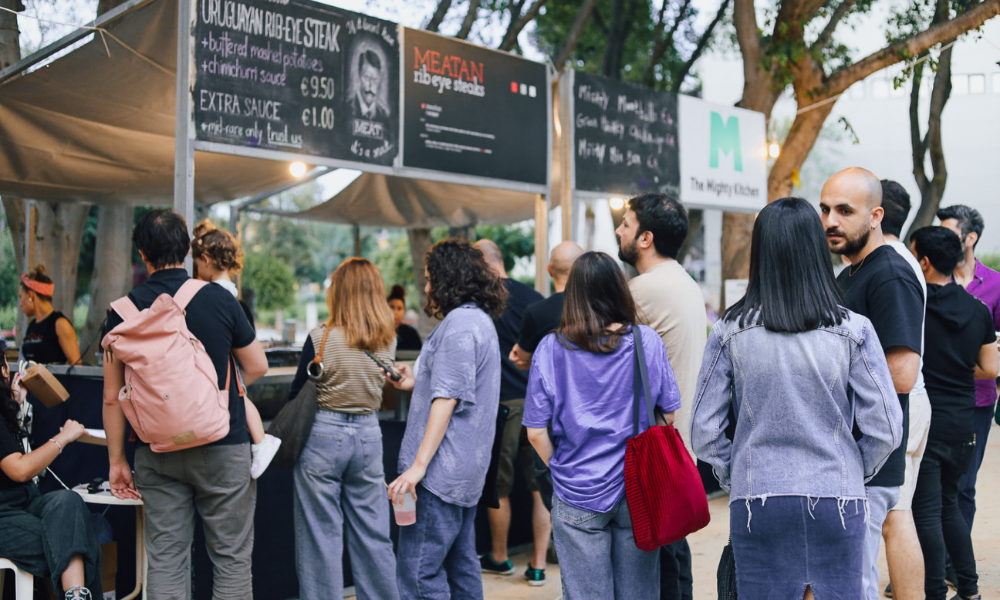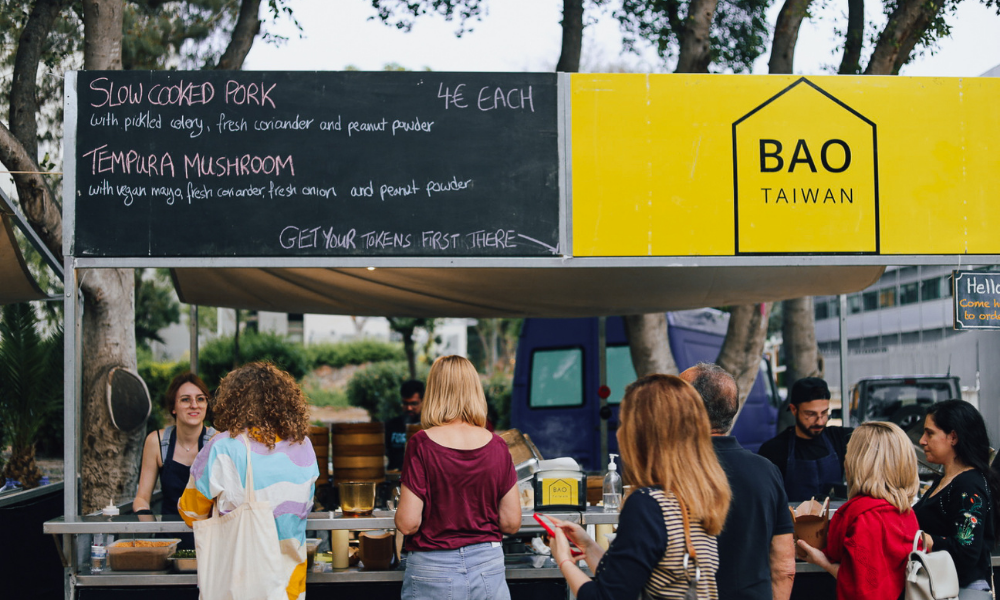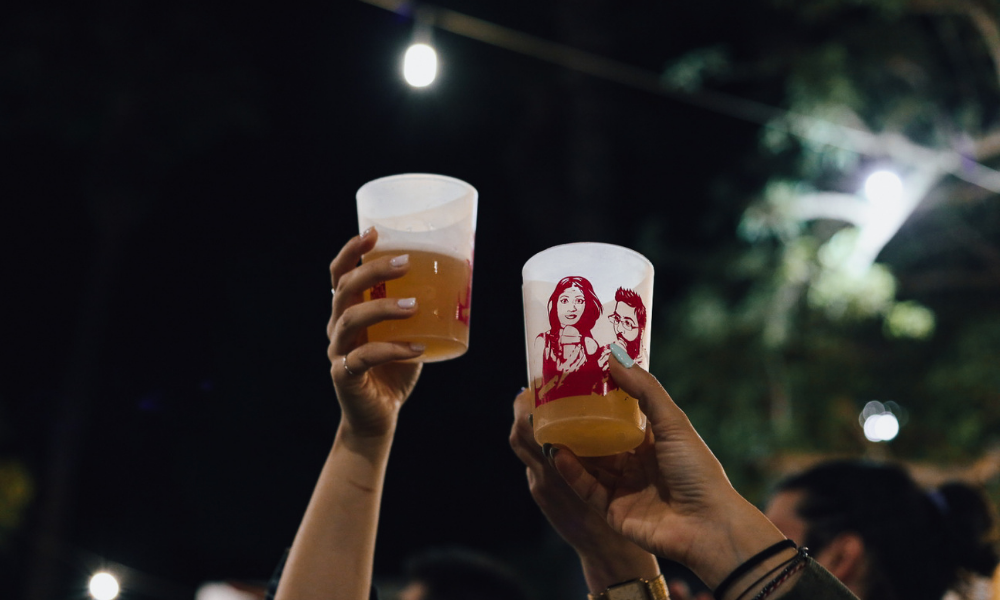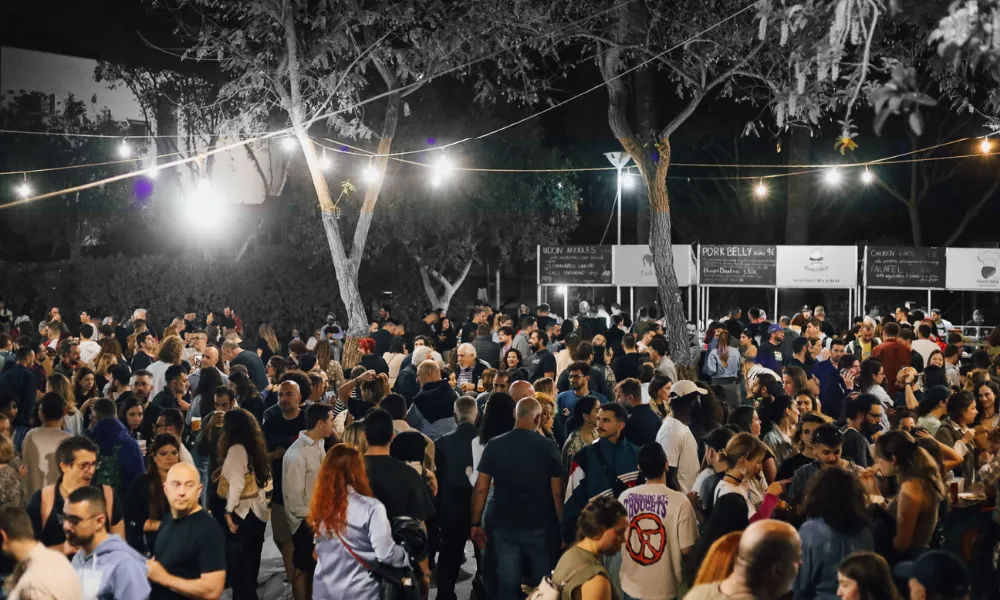Music slips between eucalyptus trunks just after six on a Friday, and the Municipal Gardens glow under strings of festoon lights. An early crowd circles sizzling skillets while bartenders stack the reusable Fork cups that have replaced single‑use plastic. Limassol students, aid workers from Larnaka, and grandparents from the suburbs trade greetings as steam from pad Thai and oregano fries curls into the spring air.
The scene repeats twelve nights a year, yet each edition feels singular. Food stalls rotate, playlists shift, and the weather flips from crisp April breezes to September’s warm hush. Regulars know to arrive hungry and unhurried, because the point is to linger and eat with friends and family.
From idea to institution
Fork Food Market launched in 2014 when two friends, Andreas and Takis, returned from their studies in London convinced that Nicosia needed its own street-food stage. In the early days, vendors were scarce, so the team cooked across several stalls themselves, with Andreas, along with his wife Katerina, who is trained in culinary arts management, and his sister, also Katerina, helping in the kitchen.
Their blueprint was simple: curate ten stalls per event and push vendors to treat a paper plate with the care a chef lavishes on fine china. From 2015, the project became a family business, and the demand has only grown since, so much so that organisers say it is now far higher than they can accommodate. This year marks Fork’s 11th season, with the market still capping its line-up at roughly nine or ten traders, a deliberate choice that lets each cook serve fast without sliding into fast food.
The festival’s rhythm is equally intentional. Events land on select Fridays, a cadence that builds anticipation instead of fatigue. When organisers added extra dates in out‑of‑town Geri, thousands followed. This kind of consistency provides a platform for semi‑professional cooks looking to test recipes in public before risking brick‑and‑mortar leases.
Why markets matter
Urban‑design research calls public markets “original civic centres,” places where economic exchange doubles as social glue. Studies tracking localised food systems report measurable gains in social, educational, and civic engagement wherever people buy meals face‑to‑face rather than through an app. Further research on public vending notes that markets provide sites for interaction across age, income, and culture, a rarity in modern cities.

These findings echo on the ground in Nicosia. Tourists queue beside office workers; toddlers weave between tables as DJs slide from Afro‑beat into laïkó (traditional Greek folk music). Conversations bloom faster when everyone holds a plate, and vendors confirm that patrons linger an average of ninety minutes, long enough to buy a second drink, swap restaurant tips, and post a half‑dozen photos.
A recipe for connection
Fork’s organisers design the physical layout to maximise mingling. Stalls form a loose horseshoe that funnels foot traffic back toward a central lawn where standing tables replace rows of chairs. The absence of fixed seating nudges strangers to share surfaces and strike up small talk while balancing bao buns and house‑brewed lemonade.

Payment options follow the same logic. Vendors accept QR codes for Revolut payments, cash, and in some cases card transactions; fast transactions shrink queues and leave more time for conversation. Even the lighting is strategic: low‑temperature bulbs warm the space without glare, flattering both food photography and people.
Home‑grown talent
Cypriot‑owned initiatives anchor every roster. “Fork Food Market is a very positive experience, especially these past two years”, says Dimitris Sacorafos, founder of Smokey Dee’s. “Before, the market was held 12 events a year. Now it’s five Fridays a year, and that makes every one of them feel special, people show up excited”.
On those nights, Dimitris serves a festival plate of salad, fries, and a mix of meats and sauces, moving about 300 portions each time. “Communication with the organizers is great. Overall, as a vendor, I’d say it’s a solid 8 out of 10 experience every time”.
Many alumni have graduated into storefronts, Top Dog set up a year‑round kiosk near the old city walls, while Sophie’s Choice now supplies pâtisserie counters across the island. Their success stories reinforce the market’s role as an incubator for Cypriot culinary creativity, ensuring that profits and pride stay local even as menus roam the globe.
Sustainability served side‑by‑side
Environmental conscience threads through the festival. The shift to reusable cups has eliminated an estimated 12,000 plastic vessels per season, according to organiser tallies. Waste‑sorting tents funnel compostables toward municipal recycling, and solar‑charged lamps power vendor signs on the Geri site where plug‑in sockets are scarce.

These choices resonate with a generation of diners who read carbon footprints alongside calorie counts. They also dovetail with Cyprus’ broader push to position its gastronomy as both heritage and forward‑looking craft, echoing agritourism programmes that tie vineyard tours to village tavern suppers.
The season ahead
Fork Food Market returned to Nicosia’s Municipal Gardens on 25 April and 9 May before the summer pause. Each date delivered ten fresh menus, draught beer brewed in Limassol, and music that carried well past the final kitchen call. Entry stayed free, and appetite remained the only ticket.
The season continues, with the final event of the year set for 10 October at 6pm.
